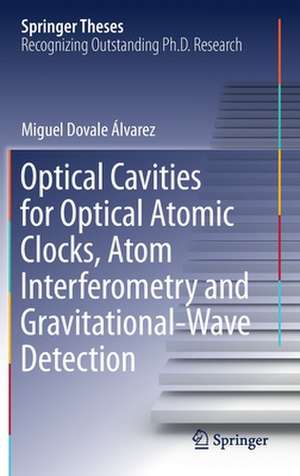Optical Cavities for Optical Atomic Clocks, Atom Interferometry and Gravitational-Wave Detection: Springer Theses
Autor Miguel Dovale Álvarezen Limba Engleză Hardback – 24 aug 2019
| Toate formatele și edițiile | Preț | Express |
|---|---|---|
| Paperback (1) | 639.25 lei 6-8 săpt. | |
| Springer International Publishing – 25 aug 2020 | 639.25 lei 6-8 săpt. | |
| Hardback (1) | 645.47 lei 6-8 săpt. | |
| Springer International Publishing – 24 aug 2019 | 645.47 lei 6-8 săpt. |
Din seria Springer Theses
- 18%
 Preț: 997.88 lei
Preț: 997.88 lei -
 Preț: 389.88 lei
Preț: 389.88 lei - 15%
 Preț: 646.94 lei
Preț: 646.94 lei - 18%
 Preț: 943.43 lei
Preț: 943.43 lei -
 Preț: 399.29 lei
Preț: 399.29 lei - 18%
 Preț: 944.99 lei
Preț: 944.99 lei - 15%
 Preț: 636.80 lei
Preț: 636.80 lei - 18%
 Preț: 941.05 lei
Preț: 941.05 lei - 15%
 Preț: 643.16 lei
Preț: 643.16 lei - 15%
 Preț: 642.68 lei
Preț: 642.68 lei - 18%
 Preț: 1103.62 lei
Preț: 1103.62 lei - 20%
 Preț: 558.82 lei
Preț: 558.82 lei - 18%
 Preț: 1112.30 lei
Preț: 1112.30 lei - 18%
 Preț: 944.19 lei
Preț: 944.19 lei - 18%
 Preț: 1109.92 lei
Preț: 1109.92 lei - 18%
 Preț: 1217.27 lei
Preț: 1217.27 lei - 15%
 Preț: 640.06 lei
Preț: 640.06 lei - 15%
 Preț: 636.45 lei
Preț: 636.45 lei - 15%
 Preț: 640.06 lei
Preț: 640.06 lei - 15%
 Preț: 640.88 lei
Preț: 640.88 lei -
 Preț: 389.70 lei
Preț: 389.70 lei - 20%
 Preț: 563.89 lei
Preț: 563.89 lei -
 Preț: 393.35 lei
Preț: 393.35 lei - 15%
 Preț: 637.93 lei
Preț: 637.93 lei - 15%
 Preț: 641.85 lei
Preț: 641.85 lei - 18%
 Preț: 1225.94 lei
Preț: 1225.94 lei - 20%
 Preț: 551.36 lei
Preț: 551.36 lei - 18%
 Preț: 1229.10 lei
Preț: 1229.10 lei - 15%
 Preț: 639.25 lei
Preț: 639.25 lei - 18%
 Preț: 999.45 lei
Preț: 999.45 lei - 15%
 Preț: 640.06 lei
Preț: 640.06 lei - 18%
 Preț: 1220.45 lei
Preț: 1220.45 lei - 18%
 Preț: 1116.26 lei
Preț: 1116.26 lei - 18%
 Preț: 1110.72 lei
Preț: 1110.72 lei - 18%
 Preț: 1000.87 lei
Preț: 1000.87 lei - 18%
 Preț: 891.17 lei
Preț: 891.17 lei - 15%
 Preț: 640.06 lei
Preț: 640.06 lei - 5%
 Preț: 1154.07 lei
Preț: 1154.07 lei - 15%
 Preț: 635.96 lei
Preț: 635.96 lei - 15%
 Preț: 640.88 lei
Preț: 640.88 lei -
 Preț: 387.20 lei
Preț: 387.20 lei - 18%
 Preț: 1109.92 lei
Preț: 1109.92 lei -
 Preț: 385.25 lei
Preț: 385.25 lei -
 Preț: 385.25 lei
Preț: 385.25 lei - 18%
 Preț: 1112.30 lei
Preț: 1112.30 lei - 18%
 Preț: 999.45 lei
Preț: 999.45 lei -
 Preț: 386.99 lei
Preț: 386.99 lei - 15%
 Preț: 637.13 lei
Preț: 637.13 lei - 20%
 Preț: 554.20 lei
Preț: 554.20 lei - 20%
 Preț: 555.57 lei
Preț: 555.57 lei
Preț: 645.47 lei
Preț vechi: 759.37 lei
-15% Nou
Puncte Express: 968
Preț estimativ în valută:
123.54€ • 128.49$ • 103.53£
123.54€ • 128.49$ • 103.53£
Carte tipărită la comandă
Livrare economică 13-27 martie
Preluare comenzi: 021 569.72.76
Specificații
ISBN-13: 9783030208622
ISBN-10: 3030208621
Pagini: 252
Ilustrații: XXIV, 245 p. 128 illus., 88 illus. in color.
Dimensiuni: 155 x 235 mm
Greutate: 0.56 kg
Ediția:1st ed. 2019
Editura: Springer International Publishing
Colecția Springer
Seria Springer Theses
Locul publicării:Cham, Switzerland
ISBN-10: 3030208621
Pagini: 252
Ilustrații: XXIV, 245 p. 128 illus., 88 illus. in color.
Dimensiuni: 155 x 235 mm
Greutate: 0.56 kg
Ediția:1st ed. 2019
Editura: Springer International Publishing
Colecția Springer
Seria Springer Theses
Locul publicării:Cham, Switzerland
Cuprins
Atomic clocks, cold atoms and gravitational waves.- Part 1: Cavities for Optical Atomic Clocks.- Thermal-noise-limited room-temperature ULE cavity.- Isolation from external perturbations.- Measuring resonator stability.- Part 2: Cavities for Atom Interferometry.- Cavity atom optics.- Fundamental limitations of cavity-assisted atom interferometry.- Gravitational wave detection with cavity-assisted atom interferometry.- 4-mirror large-waist cavity with tuneable stability for enhanced atom interferometry.- Part 3: Cavities for Gravitational-wave Detection.- Near-unstable cavities for future gravitational wave detectors.- Modelling parametric instabilities at Advanced LIGO and ET.- Summary and conclusions.- Appendix.
Notă biografică
Miguel Dovale Alvarez (Santiago de Compostela, 1989) is a spanish-american physicist and member of the LIGO Scientific Collaboration. He holds a Licenciatura in Physics from Universidade de Santiago de Compostela (Spain), and a PhD from the University of Birmingham (UK). His main research interests are laser interferometry, quantum optics and gravitational physics. During his doctorate he developed a thermal-noise-limited Fabry-Perot interferometer at the National Physical Laboratory (UK). Dovale is now a postdoc at the Max Planck Institut für Gravitationsphysik (Hannover, Germany), where he works in several aspects of the LISA interferometry chain.
Textul de pe ultima copertă
Devised at the beginning of the 20th century by french physicists Charles Fabry and Alfred Perot, the Fabry-Perot optical cavity is perhaps the most deceptively simple setup in optics, and today a key resource in many areas of science and technology. This thesis delves deeply into the applications of optical cavities in a variety of contexts: from LIGO’s 4-km-long interferometer arms that are allowing us to observe the universe in a new way by measuring gravitational waves, to the atomic clocks used to realise time with unprecedented accuracy which will soon lead to a redefinition of the second, and the matterwave interferometers that are enabling us to test and measure gravity in a new scale. The work presented accounts for the elegance and versatility of this setup, which today underpins much of the progress in the frontier of atomic and gravitational experimental physics.
Caracteristici
Nominated as an outstanding Ph.D. thesis by the University of Birmingham,Birmingham, UK Gives fascinating insights into the many powerful applications of the Fabry-Perot optical cavity With experimental work undertaken at the National Physical Laboratory and within the LIGO Collaboration
